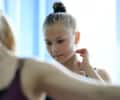What's Really Exchanged in a Kiss?
According to a study published in the journal Microbiome, you have over 700 species of bacteria and organisms in your mouth. These bacteria are found in your saliva and on your oral surfaces, including your teeth, tongue, cheeks and surrounding areas. As the study explains, your tongue, in particular, is responsible for many of the microorganisms that wind up in your saliva.
So, what happens when two people kiss? In a single kiss lasting approximately 10 seconds, a whopping 80 million bacteria can be transferred from mouth to mouth!
Benefits of Kissing on Oral Health
You may question how the exchange of saliva and bacteria could possibly be healthy, but kissing may offer some notable oral health benefits.
For starters, kissing can increase salivary flow, as the Victoria State Government notes. Saliva is important because it helps to wash away excess food debris in the mouth and neutralizes harmful acids that can cause tooth decay, explains the Mayo Clinic. Some organisms in your saliva can actually help to decrease bacterial growth and even slow down plaque formation, as noted by the British Society for Immunology. Certain organisms in saliva help stop the growth of harmful bacteria, such as those responsible for oral thrush or strains of Streptococcus bacteria, which play a part in tooth decay. In short, a healthy saliva flow promotes a healthy mouth.
And while kissing isn't a sure path to immunity, the Victoria State Government reports that kissing exposes you to more germs, which can help to boost your immune system. So, to some degree, you're strengthening your body's resistance to infectious organisms when sharing a kiss!
Risks of Swapping Saliva
There is always some risk of illness when coming into contact with bodily fluid. Kissing can make you susceptible to contagious illnesses, such as the common cold, herpes simplex virus or certain mouth warts, as the Victoria State Government notes.
Kissing can also transmit the bad bacteria that lead to cavities. This risk is particularly important to keep in mind when kissing babies and newborns. They don't have the bacteria that cause tooth decay in their mouths at birth, but if someone with infected saliva kisses them, those bacteria can then colonize.
How to Maintain Oral Health When Kissing
The act of kissing has its benefits and risks, and it can ultimately affect your oral health. Follow these tips and best practices from the Victoria State Government to ensure that your gesture has no unintended consequences:
- Avoid kissing babies directly on the lips to prevent putting them at risk for tooth decay.
- Do not kiss someone if you — or they — are ill or have any mouth sores present.
- Maintain optimal oral hygiene, which includes brushing your teeth twice daily, flossing once daily and visiting your dentist every six months.
It's in everyone's best interest to maintain excellent oral and bodily health. Keep in mind these risks and benefits of kissing on oral health, and feel good about sharing this intimate gesture safely!
Oral Care Center articles are reviewed by an oral health medical professional. This information is for educational purposes only. This content is not intended to be a substitute for professional medical advice, diagnosis or treatment. Always seek the advice of your dentist, physician or other qualified healthcare provider.
ORAL HEALTH QUIZ
What's behind your smile?
Take our Oral Health assessment to get the most from your oral care routine
ORAL HEALTH QUIZ
What's behind your smile?
Take our Oral Health assessment to get the most from your oral care routine
Join Us
Get the best of your oral health routine and take it to the next level with expert advice, recommendations, products and solutions and special offers.
Join Us
Get the best of your oral health routine and take it to the next level with expert advice, recommendations, products and solutions and special offers.















